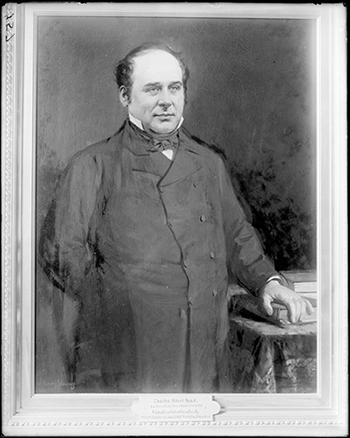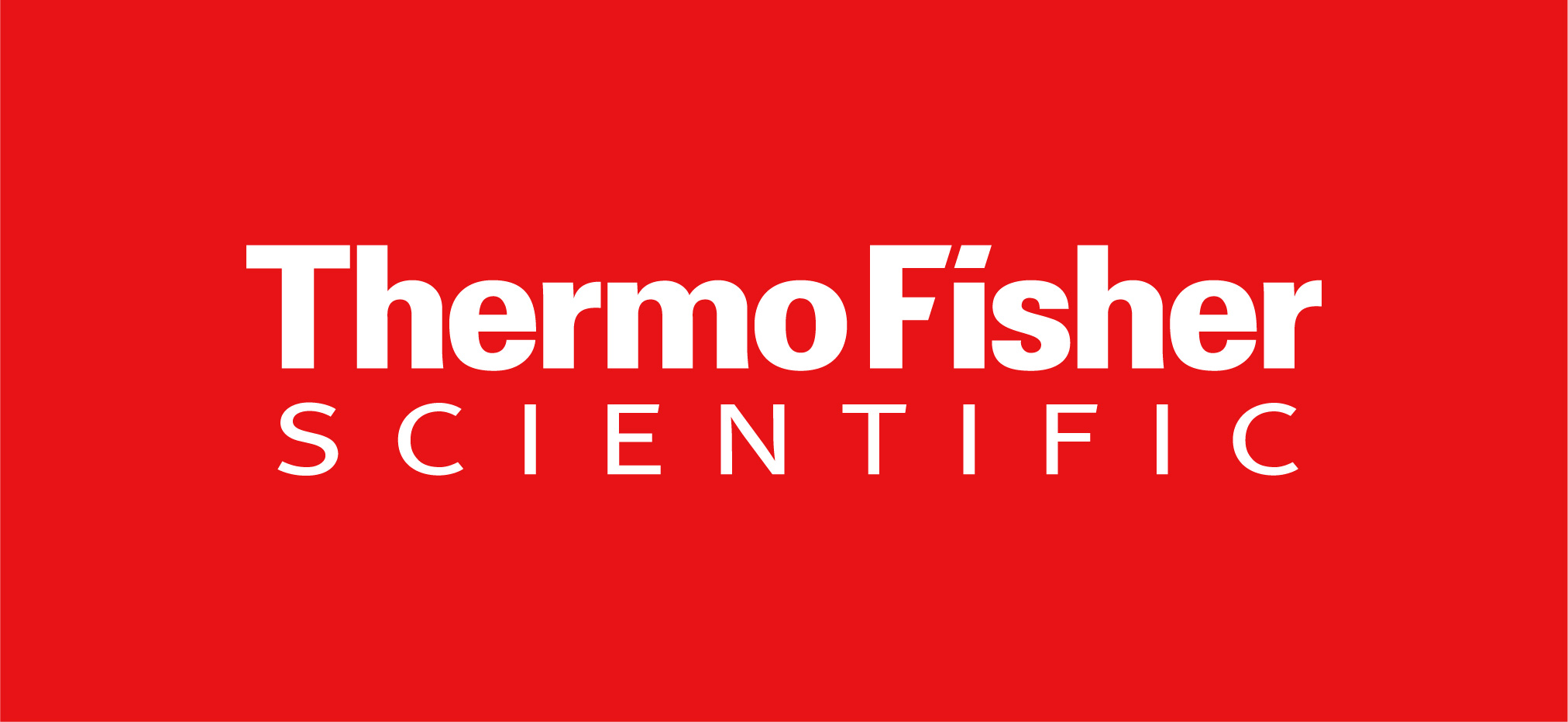Salem State's annual Darwin FestivalSM is a weeklong event that celebrates the work of Charles Darwin, with sessions from leading researchers celebrating the field of biology and its impact on today's world.
2026 Darwin Festival
The 2026 Darwin FestivalSM will take place Monday, February 9 through Friday, February 13.
Location
All in-person talks will be held in Vets Hall, Ellison Campus Center, North Campus. Five talks are webinar only. Events are free and open to the public.
Students and guests who anticipate needing accommodations due to a disability or who have questions about access may contact the Center for Accessible Academic Resources at access@salemstate.edu, Jason Brown or Ethel Gordon for more information.
Monday, February 9
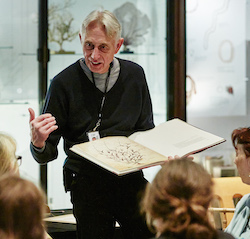
11am
John Hunnex (Founders Lecture - Webinar), Curator, British and Irish Herbarium, Natural History Museum, London, UK
"The Natural History Museum, London, and Charles Darwin"
Register for the National History Museum webinar.
You may join us in-person in Vets Hall to watch this webinar. Light refreshments will be available.
London’s Natural History Museum opened its doors to the public in 1881. Today a statue of Charles Darwin has pride of place in the main hall. To the surprise of many, Darwin never set foot in the building and had no role in the planning of the “Cathedral of Nature”. We hold comparatively few of his specimens. However, Darwin’s successful theory underpins the museum’s research themes. Knowledge produced from Natural History and conclusions from that knowledge, including Natural Selection, would promote fierce intellectual conflict during the “long” 19th century, the British century. The driving force behind the creation of the Natural History Museum, Richard Owen, in the words of his biographer was “eclipsed by Darwin”. The significant Darwin specimens that the Museum does hold are from the Ornithological collections from the Voyage of the Beagle but, perhaps surprisingly, from closer to home here in the United Kingdom. We will look at those and discuss their significance. We will also examine additional research projects, including the one that led to our collaboration with Salem State. Another of Darwin’s great anticipations was the discovery of the mechanism for species change, the mutation of the DNA molecule. We are re-curating our collections to an order derived from DNA sequencing - a massive task. It’s a privilege to work with collections of such huge significance. Perhaps I can offer advice to anyone who’d like to take a career path similar to mine.
Sponsored by Thermo Fisher Scientific
Tuesday, February 10
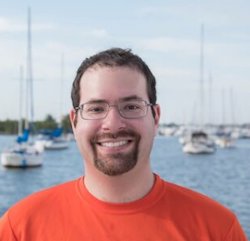
10:50 am
David Shiffman (webinar), Interdisciplinary marine conservation biologist, David Shiffman Scientific and Environmental Consulting, Washington, DC
“Why everything you know about shark conservation is wrong: an interdisciplinary look at public misunderstanding of conservation science”
Register for the shark conservation webinar.
You may join us in-person in Vets Hall to watch this webinar. Light refreshments will be available.
Sharks are some of the most ecologically important, most threatened, and most misunderstood animals on Earth. If we are to avoid extinction of animals that have been around since before trees existed on land, strong conservation protections based on evidence and data are an urgent necessity. Fortunately, more people care about the environment and want to help than ever before. Unfortunately, ocean conservation discussions are plagued by misinformation, pseudoscience, and extremism. In this talk, Dr. David Shiffman will present some key results from his decade of work trying to understand the causes and consequences of public misunderstanding of ocean conservation threats and their solutions. Where did so many people learn wrong information about these important topics, and what can experts do to get things moving in the right way?
Sponsored by the Biology Department.
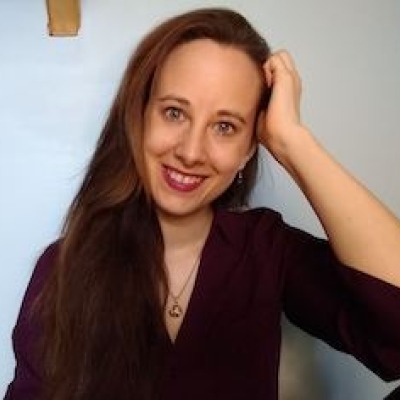
12:15 pm
Shaina Sadai (webinar) (Geography and Sustainability Speaker), Climate Scientist and Critical Physical Geographer, Five College Associate, MA
“Sea Level Rise and Multispecies Climate Justice”
Register for the sea level rise webinar. (Remote Only)
Climate change is causing sea levels to rise at an accelerating rate, impacting shorelines around the world. The long-term impacts will occur over generations and will be highly spatially variable along coastlines. Sea level rise impacts and adaptation responses vary geographically and affect all who dwell in or move through coastal spaces. The emerging lens of multispecies climate justice allows us to look deeper into the interrelated ecologies of climate impacts by considering a broad assessment of interrelated beings and ecosystems. This talk will discuss research on the global impacts of sea level rise on nonhuman animals, and implications for advancing multispecies climate justice. This work was a collaborative project with my former undergraduate students Ava Sharpe, Rory Crisfield, Libby Rankin, and Caitlin Bolzan.
Sponsored by the Charles Albert Read Trust.
Wednesday, February 11
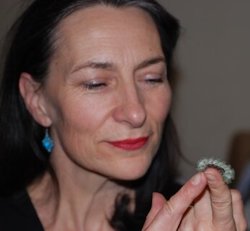
9:25 am
Jayne Yack (BioSociety Speaker--webinar), Professor, Carleton University
“The Final Frontier: Exploring the Vibratory Worlds of Insects”
Register for the vibratory worlds of insects webinar.
You may join us in-person in Vets Hall to watch this webinar. Light refreshments will be available.
Insects live in a vibratory world, where substrate-borne vibrations are a key component of their sensory ecology. Historically considered a private and specialized communication channel, vibratory sensing and communication is now recognized as widespread and ecologically relevant to many organisms. Insects inhabit complex vibroscapes where they experience substrate-borne vibrations arising from multiple biotic and abiotic sources, which together create a rich and dynamic vibratory landscape. I will talk about my laboratory's research on the complex vibroscapes of birch trees, and specifically, their caterpillar residents. Although previously thought to be primarily deaf and mute, we now have burgeoning evidence that caterpillars and other larval insects employ a wide range of complex sounds and vibrations in their daily activities. I will talk about how caterpillars use vibrations to engage in territorial 'rap' battles, coordinate social activities, and fend off enemies. I will also discuss unexpected insights we have gained from studying these unassuming creatures in their vibratory worlds, including the evolutionary origins of animal communication signals and proximate mechanisms underlying sociality. It can be concluded that the vibroacoustic landscape of insects remains unchartered territory ripe for further exploration and discovery!
Sponsored by the Charles Albert Read Trust.
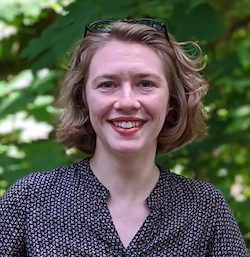
12:15 pm
Dana Reuter (Geological Sciences speaker), Visiting Lecturer, Department of Geological Sciences, Salem State University
“Investigating the influence of diet on mammalian evolution: are you what you eat?”
Darwin well knew that climate and its effects on food availability in the environment played a major role in natural selection. In the almost 200 years since his writings, we have learned much more about how an animal’s diet is linked to almost every other aspect of its ecology and evolution. As a paleontologist, I use a variety of methods to test hypotheses about the ecological links among extinct taxa and their environment. By both looking at the fossil record and modern animals, we can better understand the processes that govern organismal diet, ecological diversity, and changes in ecological communities. In this talk, I will discuss insights from several projects that have aimed to answer the question: how has diet influenced mammalian evolution and extinction through time?
Sponsored by the Charles Albert Read Trust.
Thursday, February 12
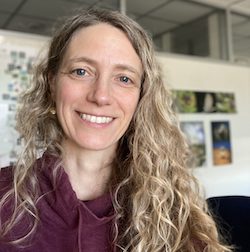
9:25 am
Lynn Fletcher, Professor, Department of Biology, Salem State University
“Evolving Worldviews and their Impacts: Bringing in Indigenous Perspectives”
Worldviews shape our relationship to the life around us. Today’s ecological crisis is primarily driven by human activity, leaving us with the impression that humans inherently have a negative impact on the planet. However, indigenous cultures have persisted for millennia, living in ways that promote biodiversity and create conditions of mutual thriving. We'll discuss some of the values held in Indigenous worldviews and see how humans can have a positive impact on the world around them!
Sponsored by the Charles Albert Read Trust.
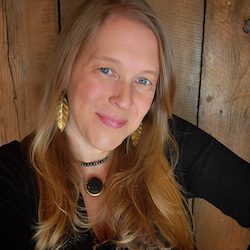
10:50 am
Leigh Ann Henion (webinar), New York Times Bestselling Author, Journalist & Award Winner, Author of Night Magic
“Appreciating the Magic of Natural Night”
Register for the magic of natural light webinar.
You may join us in-person in Vets Hall to watch this webinar. Light refreshments will be available.
Leigh Ann Henion is the New York Times bestselling author of Night Magic: Adventures Among Glowworms, Moon Gardens, and Other Marvels of the Dark (2024) and Phenomenal: A Hesitant Adventurer’s Search for Wonder in the Natural World (2015). Her writing has appeared in The Washington Post, Smithsonian, Backpacker, Garden & Gun, National Geographic, Men’s Journal, and a variety of other publications. Her essays and articles have been cited as notable in The Best American Essays, The Best American Travel Writing, The Best American Sports Writing, and The Best American Science & Nature Writing. She is a former Alicia Patterson Fellow, and her work has been supported by the Alfred P. Sloan Foundation.
Night Magic was, in part, inspired by an article Henion wrote for The Washington Post Magazine about synchronous fireflies. After that piece ran, many readers reached out to let her know that they’d started turning off their porch lights more often, and she was amazed that her story had inspired real-world action that led to reduced light pollution. Henion subsequently spent several years in the company of owls, moths, salamanders, and other nocturnal creatures to explore the importance of natural darkness in an age of increasing artificial light.
The Wall Street Journal called Night Magic, “lovely…truly inspired…and very clever.” In a starred review, Kirkus said, “Henion writes with poetic grace.” And Publishers Weekly reported, “Henion’s greatest gift is her ability to evoke the sense of wonder that follows from tuning in to the natural world. This will fill readers with awe.” Henion aims to continually inspire awe, both in person and on the page.
Sponsored by the Biology Department, the College of Arts and Sciences, and the Charles Albert Read Trust.
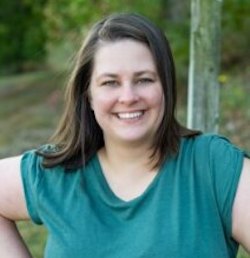
1:40 pm
Erica Polleys, Ph.D. (Sigma Xi Speaker) Assistant Professor of Bioengineering and Biotechnology, Endicott College
“A genomic threat: How repetitive DNAs cause DNA damage and mutations”
Much of the human genome is comprised of repetitive DNA sequences. Microsatellite regions are small sequences which repeat, can change in length and cause over 30 inherited neurodegenerative disorders. Biochemical characteristics of DNA mean microsatellite repeats can form non-linear DNA structures and impede DNA transactions. My talk will focus on how microsatellite sequences must be negotiated during essential processes like DNA repair and discuss the human consequences when accurate repair fails at these sites.
Sponsored by the Biology Department.
Alumni-Student Social
Please consider joining us for an alumni-student evening from 6:30-9 pm Thursday evening in the commuter lounge of the Ellison Campus Center. For questions and to RSVP, please contact Ryan Fisher.
Friday, February 13
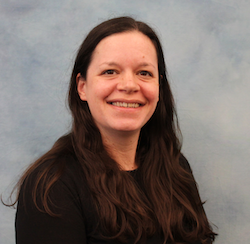
9:25 am
Lindsay Green-Gavrielidis, Associate Professor, Department of Biology, Salem State University
“Evolving Ecosystems: Seaweeds in a Changing Climate”
When most people visit the seashore and decide to poke around to look at organisms, they are typically focused on the animals and especially the ones they see moving. While seaweeds might be overlooked by many, they form the base of most marine ecosystems. Habitat-forming seaweeds are those that form the three-dimensional structure of coastal habitats and include many species of rockweeds and kelps. Due to the combined effects of climate change, especially increased sea surface temperature, the abundance and distribution of habitat-forming seaweeds have been changing. These changes are likely to cause ripple effects through entire coastal marine ecosystems that may affect which species are present and in what quantities. In this talk, Dr. Green-Gavrielidis will share research on how habitat-forming seaweeds in the northwest Atlantic are changing, and offer a glimpse at what may be local adaptation in seaweed populations to changing conditions. Dr. Green-Gavrielidis will also highlight findings from other temperate regions and propose future research areas to better understand the complexity of the response of seaweeds to climate change stressors.
Sponsored by Thermo Fisher Scientific.
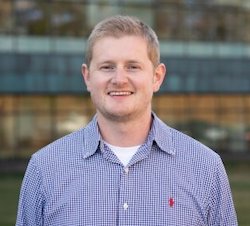
10:50 am
James Elliott (Alumni Speaker) Process Development Scientist, New England Biolabs
“Of Moose and Men: Evolutionary Threads in Wildlife Disease and Vaccine Manufacturing”
Moose calves (Alces alces americana) in northern climates face substantial nutritional stress during winter, and many carry extraordinary winter tick (Dermacentor albipictus) burdens—sometimes exceeding 90,000 ticks per animal. To date, nearly 400 collared calves and 51 adult cows in northern Maine have been examined for how co-infection with an uncharacterized Anaplasma bacteria and varying winter tick loads influences survival and fitness. Calves experiencing both Anaplasma blood infection and moderate to heavy tick loads showed a marked reduction in overwinter survival probability. Physiological indicators suggest that Anaplasma infection contributes to anemia and may alter immune function. These findings highlight how co-infecting parasites compound stress in a population already challenged by climate-driven tick proliferation, underscoring the importance of genetic and ecological monitoring for a species of major cultural, ecological, and economic significance in Maine.
The second section part of the talk shifts to the molecular manufacturing landscape during the COVID-19 pandemic, detailing an Alumni’s journey to being a part of how New England Biolabs mobilized to support Moderna’s mRNA vaccine program. I describe the rapid scaling and manufacturing process development of critical enzymatic reagents and the collaborative problem-solving required to maintain uninterrupted access to high-quality raw materials essential for vaccine production. This high level behind-the-scenes view illustrates how industrial biotechnology can respond with speed and precision when the stakes are global.
Sponsored by Thermo Fisher Scientific.
More Information
From the Darwin Festival Archive
Founded in 1980 by Philip A. DePalma and Virginia F. Keville.
Questions?
Students and guests who anticipate needing accommodations due to a disability or who have questions about access may contact the Center for Accessible Academic Resources at access@salemstate.edu.
Interested in the 2026 Darwin FestivalSM? Contact Jason Brown or Ethel Gordon for more information.
Past Darwin Festival Recordings
Thank You to Our Supporters
Major support for the Darwin FestivalSM comes from the Charles Albert Read Trust and Thermo Fisher Scientific.
